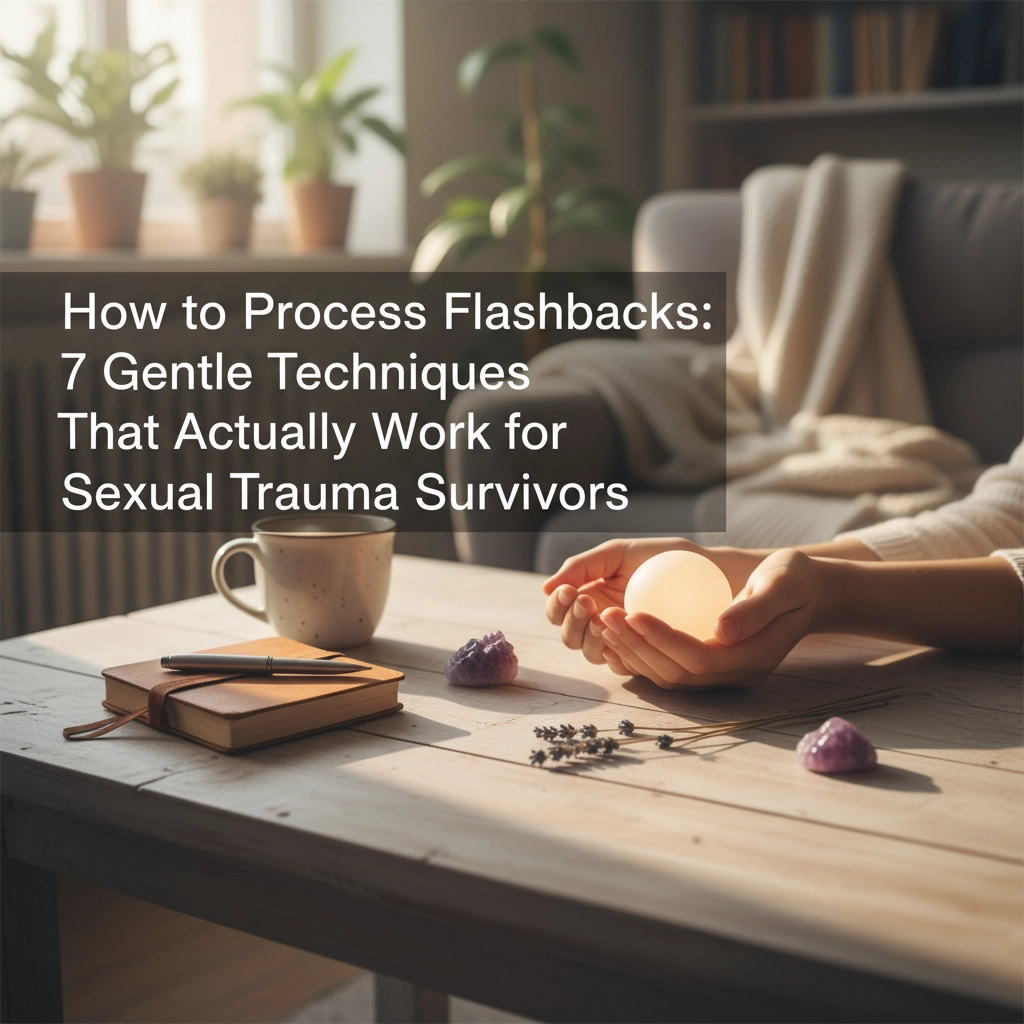
If you're reading this, chances are you've experienced a flashback: or you're supporting someone who has. First, let me say this: having flashbacks after sexual trauma is completely normal. Your brain is doing exactly what it was designed to do to keep you safe. There's no shame in that.
Flashbacks can feel overwhelming and scary, but they're actually your nervous system's way of processing something that was too much to handle at the time it happened. The good news is that there are gentle, evidence-based techniques that can help you feel more in control when they occur.
What's Really Happening During a Flashback
When you experience a flashback, your brain's alarm system (the limbic system) gets activated as if the trauma is happening right now. Your body doesn't know the difference between remembering something dangerous and being in actual danger. This is why flashbacks can feel so real and intense: your nervous system is genuinely trying to protect you.
Understanding this can help reduce some of the fear around flashbacks. You're not "losing it" or "going crazy." Your brain is working exactly as it should, given what you've been through.
Technique 1: Ground Yourself Through Your Five Senses
One of the most effective ways to interrupt a flashback is to anchor yourself in the present moment using your senses. This technique works because it helps your brain distinguish between the past trauma and your current safety.
Start with what you can see around you right now. Name five things you can see: maybe the color of the walls, a plant in the corner, or the texture of your clothing. Then move to four things you can touch, three things you can hear, two things you can smell, and one thing you can taste.
This isn't about forcing anything or making the flashback stop immediately. It's about gently reminding your nervous system where you actually are: safe, in the present moment.

Technique 2: Use Your Breath as an Anchor
When flashbacks hit, your breathing often becomes shallow and rapid. This sends more alarm signals to your brain. By consciously slowing and deepening your breath, you can help calm your nervous system.
Try this: breathe in slowly through your nose for a count of four, hold for a count of four, then exhale through your mouth for a count of six. The longer exhale is key: it activates your parasympathetic nervous system, which is responsible for the "rest and digest" response.
If counting feels too complicated during a flashback, that's okay. Just focus on making your exhale longer than your inhale. Even that small shift can make a difference.
Technique 3: Remind Yourself What's True Right Now
During a flashback, it can help to gently remind yourself of what's actually happening. This isn't about dismissing your experience: it's about helping your brain catch up to reality.
Try saying to yourself: "I'm having a flashback. This is a memory of something that already happened. I survived it then, and I'm safe right now." You might also remind yourself of basic facts about the present: "It's Monday. I'm in my living room. I'm 35 years old now."
Some people find it helpful to have these reminders written down on their phone or on a card they can reference. When you're in the middle of a flashback, it's hard to think clearly, so having these truths readily available can be incredibly grounding.
Technique 4: Find or Create Physical Safety
If possible, move to a space where you feel safe and secure. This might be your bedroom, a cozy corner of your living room, or even just stepping outside for fresh air. If you can't physically move, you can create a sense of safety by wrapping yourself in a blanket, holding a comforting object, or even just placing your back against a wall.
The goal isn't to hide from your feelings, but to create an environment where your nervous system can start to calm down. Sometimes having your back protected or being in a smaller space can help your body feel more secure.

Technique 5: Use Gentle Physical Grounding
Physical grounding techniques can help interrupt the flashback by giving your nervous system something concrete to focus on in the present moment. The key word here is gentle: you're not trying to shock yourself out of the flashback.
Try pressing your feet firmly into the ground, or gently tapping your hands on your thighs. Some people find it helpful to hold an ice cube or splash cool water on their face. Others prefer progressive muscle relaxation: gently tensing and then releasing different muscle groups.
Notice what feels good to your body right now. Trust your instincts about what feels comforting versus what feels overwhelming.
Technique 6: Reconnect With Safe Parts of Your Body
Trauma can create a disconnection from your body, but part of healing involves slowly and safely reconnecting with physical sensations that feel okay. This technique is about identifying parts of your body that feel safe or neutral to focus on.
Maybe it's your hands, your feet, or your shoulders. Gently place your attention there. Notice the sensations without judgment: warmth, coolness, tension, or relaxation. If you're comfortable, you might gently touch or massage these areas.
This isn't about forcing anything or pushing through discomfort. If focusing on your body feels overwhelming, that's completely normal. Come back to your breath or your five senses instead.

Technique 7: Reach Out for Support
Having flashbacks can feel isolating, but you don't have to go through this alone. When you're ready, consider reaching out to someone in your support system: a trusted friend, family member, or counselor who understands trauma.
Sometimes just hearing a familiar, caring voice can help remind your nervous system that you're safe. You don't have to explain everything that's happening; sometimes just saying "I'm having a difficult moment and could use some support" is enough.
If you don't have someone to call, consider joining an online support group for trauma survivors or contacting a crisis support line. Many people find comfort in knowing that others have walked this path and found healing.
Moving Forward With Compassion
Remember, healing from sexual trauma isn't linear. Some days will be harder than others, and that's okay. Flashbacks might feel scary, but they're actually a sign that your nervous system is trying to process and heal from what happened to you.
These techniques aren't about making flashbacks disappear forever: they're about helping you feel more equipped to handle them when they do occur. With practice, many people find that flashbacks become less intense and less frequent over time.
If you're finding that flashbacks are significantly impacting your daily life, working with a trauma-informed therapist can provide additional support and healing tools. EMDR therapy and other trauma-focused approaches can be particularly helpful for processing traumatic memories in a safe, controlled way.
You deserve support, healing, and peace. These techniques are one piece of your healing journey, and every small step you take toward caring for yourself matters more than you know.
